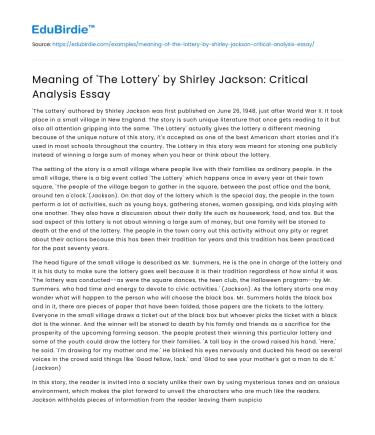'The Lottery' authored by Shirley Jackson was first published on June 26, 1948, just after World War II. It took place in a small village in New England. The story is such unique literature that once gets reading to it but also all attention gripping into the same. 'The Lottery' actually gives the lottery a different meaning because of the unique nature of this story, it's accepted as one of the best American short stories and it's used in most schools throughout the country. The Lottery in this story was meant for stoning one publicly instead of winning a large sum of money when you hear or think about the lottery.
The setting of the story is a small village where people live with their families as ordinary people. In the small village, there is a big event called 'The Lottery' which happens once in every year at their town square, 'The people of the village began to gather in the square, between the post office and the bank, around ten o'clock.'(Jackson). On that day of the lottery which is the special day, the people in the town perform a lot of activities, such as young boys, gathering stones, women gossiping, and kids playing with one another. They also have a discussion about their daily life such as housework, food, and tax. But the sad aspect of this lottery is not about winning a large sum of money, but one family will be stoned to death at the end of the lottery. The people in the town carry out this activity without any pity or regret about their actions because this has been their tradition for years and this tradition has been practiced for the past seventy years.
Save your time!
We can take care of your essay
- Proper editing and formatting
- Free revision, title page, and bibliography
- Flexible prices and money-back guarantee
The head figure of the small village is described as Mr. Summers, He is the one in charge of the lottery and it is his duty to make sure the lottery goes well because it is their tradition regardless of how sinful it was. 'The lottery was conducted--as were the square dances, the teen club, the Halloween program--by Mr. Summers. who had time and energy to devote to civic activities.' (Jackson). As the lottery starts one may wonder what will happen to the person who will choose the black box. Mr. Summers holds the black box and in it, there are pieces of paper that have been folded, those papers are the tickets to the lottery. Everyone in the small village draws a ticket out of the black box but whoever picks the ticket with a black dot is the winner. And the winner will be stoned to death by his family and friends as a sacrifice for the prosperity of the upcoming farming season. The people protest their winning this particular lottery and some of the youth could draw the lottery for their families. 'A tall boy in the crowd raised his hand. 'Here,' he said. 'I'm drawing for my mother and me.' He blinked his eyes nervously and ducked his head as several voices in the crowd said things like 'Good fellow, lack.' and 'Glad to see your mother's got a man to do it.' (Jackson)
In this story, the reader is invited into a society unlike their own by using mysterious tones and an anxious environment, which makes the plot forward to unveil the characters who are much like the readers. Jackson withholds pieces of information from the reader leaving them suspicious of what will happen next. The writer withholds information which makes the reader wonder what will happen next on every screen of the story. An environment of tension is built whiles reading the story. 'There was a great deal of fussing to be done before Mr. Summers declared the lottery open. There were the lists to make up--of heads of families. heads of households in each family. members of each household in each family.'(Jackson). Jackson makes the story look like a real story, but the conversation was unusual as one will think when you first hear the title of the story.
The historical event of most characters was unveiled but the thoughts of some characters were missing, this makes readers think about the title of the story and how the lottery was going to end. The story satirizes a number of social issues, including the reluctance of people to reject outdated traditions, ideas, rules, laws, and practices. The lottery struggles against the protest, by solving the resolute. The villagers still used the stones even though they had forgotten the ritual and lost the box. 'Although the villagers had forgotten the ritual and lost the original black box, they still remembered to use stones. The pile of stones the boys had made earlier was ready; there were stones on the ground with the blowing scraps of paper that had come out of the box Delacroix selected a stone so large she had to pick it up with both hands and turned to Mrs. Dunbar.' (Jackson). The stones and lottery stand for how people are used as black sheep in our world today.
This story teaches us more about life and how people are used as black sheep in their own village by their own friends and family. Even though the end was unfair because one of them was stoned to death by randomly picking a black dot. Jackson's story was a bit deceiving because it was not what readers would call 'The Lottery'.






 Stuck on your essay?
Stuck on your essay?

